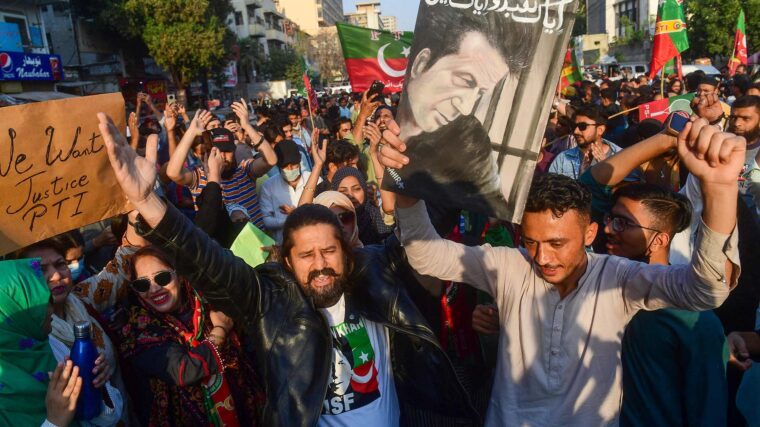In an election marred by militant violence and allegations of poll rigging, candidates backed by Pakistan’s jailed former prime minister Imran Khan out-performed those from the party of his rival, Nawaz Sharif, throwing the country into a political crisis.
Independents, a majority of which are affiliated with populist Khan’s Pakistan Tehreek-e-Insaf party, won 101 parliamentary seats, AP reported. Candidates from the Pakistan Muslim League-Nawaz party, led by Sharif, a three-time former prime minister favored by the country’s powerful military, won 75.
Many of the remaining seats in Pakistan’s National Assembly, or lower house, were split between the Pakistan People’s Party and the Muttahida Qaumi Movement, leaving no party with the 169 needed to form a majority government.
As both Khan and Sharif’s parties seek to negotiate a coalition government to determine the new prime minister, analysts are divided on what the election results may mean for Pakistan’s precarious democracy.
Shuja Nawaz, the founding director of the Atlantic Council’s South Asia Center, was optimistic, pointing to the widespread mobilization of millions of voters despite a government crackdown on mobile phone service and the prohibition of PTI symbols.
“Modern technology and social media have given the youth and women of Pakistan a way to express their views and coalesce around an idea that is not the official narrative in Pakistan,” he said.
However, Nawaz acknowledged that forming a government will be fraught amid Pakistan’s deepening economic crisis. “Any government that comes in has to take its hand out of the cookie jar, a normal habit in Pakistan,” he said.
The general election was Pakistan’s first since Khan was ousted from office in 2022 when tensions between the former cricketer and the country’s military leaders resulted in a parliamentary vote of no confidence in his leadership.
Khan was convicted of a slew of charges, ranging from corruption to adultery, barring him from running as a candidate in the election. He has denied wrongdoing and called the unprecedented legal actions against him politically motivated.
The military is a powerful political actor in Pakistan, even when it doesn’t hold power directly.
Michael Kugelman, director of the South Asia Institute
Both Khan and Sharif’s parties claimed victory before vote counting concluded. In a bizarre AI-generated video, the jailed PTI leader congratulated his supporters for their “massive turnout.” Sharif claimed victory on Friday, saying that his deputies would meet with other party leaders to try and form a coalition government, Reuters reported. The final results were released on Sunday after long delays leading to accusations of vote tampering.
After years in the Pakistani political arena, Khan rose to power after Sharif fled to London in self-imposed exile when Pakistan’s Supreme Court unanimously voted to remove him from the prime ministership in 2017.
Sharif’s ouster followed the 2016 release of ICIJ’s Panama Papers investigation, which linked members of his family to offshore shell companies and luxury London properties. He was later convicted of corruption charges stemming from the investigation and sentenced to jail in absentia. At the time, Sharif called the charges politically motivated.
Khan declared the Panama Papers leak “God-sent,” as he railed against Pakistan’s political elite, winning the prime ministership in 2018. In 2021, ICIJ’s Pandora Papers investigation found that members of Khan’s inner circle owned and hid millions of dollars in offshore companies. ICIJ did not find evidence that Khan personally owned offshore companies.
Sharif returned to Pakistan in November 2023 and a Pakistan court overturned his conviction soon after, the first of several steps that freed him to run for office again in 2024 with the tacit endorsement of the military.
“The military is a powerful political actor in Pakistan, even when it doesn’t hold power directly,” said Michael Kugelman, director of the South Asia Institute.
He said PTI’s strong electoral performance was “fueled by a strong sense of defiance” among voters, describing it as “a ‘we’re not going to take it anymore’ moment” for the electorate. Even so, he warned, the party was still likely to be shut out of the next government.
“PTI-sponsored candidates won the most seats and may have won the popular vote. But the military’s continued heavy influence over politics mean[s] that its preferred parties still have the best chance of taking power,” Kugelman said.

In a statement, the United Kingdom’s foreign secretary David Cameron noted the “serious concerns raised about the fairness and lack of inclusivity of the elections,” including the use of legal processes to exclude some candidates. A spokesperson for the U.S. Department of State also expressed concern over “undue restrictions on freedoms of expression, association, and peaceful assembly” but said the United States would work with Pakistan’s elected government.
Iran’s foreign ministry congratulated Pakistan on successful elections and wrote that the result “shows the solid place of democracy in the country,” in a post on X, formerly Twitter.
Josh Kurlantzick, a senior fellow for Southeast Asia at the Council of Foreign Relations, said voters’ rebuke of the military establishment could sow further political discontent.
“The military is being challenged for the first time seriously and they don’t know how to respond,” he said.
While Khan cannot be part of any government formed while he remains in prison, his supporters may reject a coalition without PTI representation.
“You have the potential for real anger and chaos in a country that’s already a tinderbox and is also a huge nuclear-armed power in a critical region,” Kurlantzick said.









